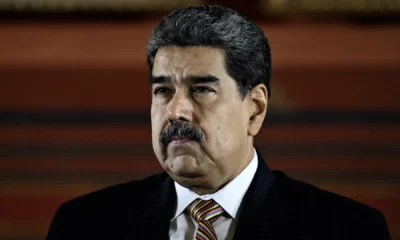News
2023 Election Polls: Tinubu, APC, React As EU Drops Bombshell With New Report

The 2023 general elections are over and a new government has commenced operations of the affairs of the state, yet the talks are still in town with no sign of fading soon.
Observations and recommendations documented by the European Union Election Observation Mission (EU-EOM) about the 2023 election in a new report have sparked reactions from the presidency and APC stakeholders.
Findings by the EU-EOM on the February 25 and March 18 elections, which worked for three months in Nigeria, between January 11 and April 11, 2023, had a total of 110 accredited observers from 25 EU member states, as well as Norway, Switzerland, and Canada.
READ ALSO: Just In: JAMB Insists Ejikeme Joy Forged Result, Bars Her From Writing UTME For 3 Years
It’s interesting to note that they were in Nigeria at INEC’s request, the country’s electoral supervisor.
According to the Chief Observer of the Mission and member of the European Parliament, Barry Andrews, the Mission was pleased to present its findings and recommendations after a three-month-long observation across Nigeria
The report, which he said was in accordance with the EU-EOM’s usual practice, noted that shortcomings in law and electoral administration hindered the conduct of well-run and inclusive elections and damaged trust in the INEC.
The Mission, however, offered 23 recommendations for consideration by the Nigerian authorities as part of its contribution to improve the future elections in Nigeria.
“We are particularly concerned about the need for reforms in six areas, which we have identified as priority recommendations, and we believe, if implemented, could contribute to improvement in the conduct of future elections,” Andrews said.
According to the report, the six priority recommendations include the removal of ambiguities in the law, establishment of a publicly accountable selection process for the INEC members, ensuring that there is a real-time publication of and access to election results, providing greater protection for media practitioners, addressing the discrimination against women in political life, as well as addressing the impunity of the electoral officers.
Andrews further reiterated the need for political will to achieve improved democratic practices in Nigeria, stressing that dialogue between all stakeholders on electoral reforms remained crucial.
“The European Union stands ready to support Nigerian stakeholders in the implementation of these recommendations,” he submitted.
While the government and the majority of the ruling APC’s supporters decried the study as biased and dishonest, some well-meaning Nigerians welcomed it, claiming that it just confirmed what the majority of the country’s citizens already knew about the elections. Since the report’s publication a few days ago, different people have reacted differently to it.
READ ALSO: EPL Footballer Accused of Rape Has Bail Extended
Reacting to the report, the presidency, through the Special Adviser to the President on Special Duties, Communication and Strategy, Dele Alake, in a statement, dismissed it as an attempt to ridicule the Nigeria electoral system and its umpire, the INEC.
The statement noted that the processes that produced the report were faulty and the parameters used by the body exposed its inadequacies and inability to conduct credible monitoring.
The presidency rejected the report for its inability to adequately reflect the largest and true picture of the election, especially the presidential election.
It also claimed that the body was only able to deploy 40 observers to the 36 states of the federation and the Federal Capital Territory, Abuja, even as it equally noted that the report was based on incidences from less than 1000 polling units out of 176,000 polling units.
It also described the 2023 general elections as the freest and most credible in the country since the advent of the current democracy in 1999.
Part of the statement from the presidency read: “With the level of personnel deployed, which was barely an average of one person per state, we wonder how EU-EOM independently monitored elections in over 176,000 polling units across Nigeria.
“We would like to know and even ask the EU how it reached the conclusions in the submitted final report with the very limited coverage of the elections by their observers who, without doubt, relied more on rumours, hearsay, cocktails of prejudiced and uninformed social media commentaries and opposition talking heads.
“We are convinced that what EU-EOM called the final report on our recent elections is a product of a poorly done desk job that relied heavily on a few instances of skirmishes in less than 1,000 polling units out of over 176,000 polling units where Nigerians voted on Election Day.
“We have many reasons to believe that the jaundiced report, based on the views of fewer than 50 observers, was merely to sustain the same premature denunciatory stance contained in the EU’s preliminary report released in March.
“We strongly reject, in its entirety, any notion and idea from any organisation, group and individual, remotely suggesting that the 2023 election was fraudulent.”
The presidency, however, expressed satisfaction that other observers of the elections from both local and international organisations, which it dubbed credible, had affirmed that the last general elections were the freest since 1999.




























